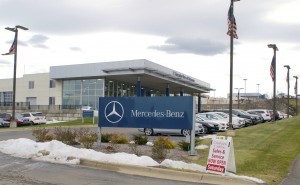
The Detroit Three automakers on Wednesday announced plans to shut down production until at least March 30, a move largely driven by the need to protect workers’ health at their parts and assembly plants. But GM, in a statement, noted that it also needs to address current “market conditions.”
As the nation comes to grips with the worsening coronavirus pandemic, new car sales appear to be tumbling off a cliff, with a new report by J.D. Power warning that March retail demand could slip by as much as 41%, approaching levels that haven’t been seen since the depths of the Great Recession a decade ago.
“Both the virus and its effect on new vehicle sales are expected to grow in severity throughout March,” wrote Tyson Jominy, a Power vice president in a report released Wednesday afternoon. “The progression will vary across the country with some markets several weeks behind the worst markets.”
(Detroit automakers set to temporarily shutter North American production.)
China has offered a strong hint of what could come in the weeks and months ahead. The novel coronavirus appears to have emerged in Wuhan, the capital of Hubei province. It took authorities weeks to respond, allowing the disease to start reaching other parts of that country and, by the beginning of February, when strict control measures were put in place, Chinese car sales collapsed, sliding 79% for the full month.

The epidemic has since spread worldwide, with the number of known cases topping 200,000 this week and growing fast. The impact has varied from country to country. In Italy, the hardest-hit country in Europe, virtually the entire economy has ground to a halt, including car sales. But the problem is growing worse in other parts of the Continent, with most automakers now planning to halt production in response.
The U.S. effort to contain the outbreak was slow initially. Now, as authorities ramp up efforts to promote “social distancing,” and have even ordered more than 7 million people in a six-county area around San Francisco to “shelter-in-place,” the overall American economy is being hit hard. And, in line with the old adage, “when the economy catches cold, the auto industry gets pneumonia.”
(Daimler, other makers cut production as virus spreads.)
After an unexpectedly strong 2019, with U.S. car sales reaching 17.1 million, the current year was expected to see a modest decline. For its part, J.D. Power originally forecast a 0.5% dip in demand during March, and during the first week, the numbers weren’t much worse, slipping about 1%.

But then things took a sharp turn for the worse. By early last week, the drop in U.S. car sales had grown to 8%, by Friday 20%. And on Sunday, dealers reported a 36% decline overall, according to Jominy.
Power’s crystal ball is foggy when looking at what comes next. Overall March numbers could be down by as little as 16%, or by as much as 41%, Jominy said, though the increasing spate of bad news is more likely to trigger a worst-case scenario. Looking further out, simulations run by Power suggest the pandemic could curb sales between March and July by anywhere from 800,000 to as much as 3.1 million vehicles, though Jominy is betting on a mid-level figure of around 1.7 million lost sales.
That doesn’t account for what might happen during the latter part of the year. But even if the market were to flatten out, that would mean a hefty 10% downturn compared to 2019 levels, the sort of decline that can hammer industry earnings. If the pandemic continues to plague the country for more than just a few months, the decline could be significantly larger – and all the more difficult for automakers to cope with.
(Facing sales collapse, wave of repos, automakers reach out to consumers.)
In turn, the Detroit manufacturers might want to extend the closure of their factories well beyond March 30, to keep from building up excess inventories. They’re well aware of what happened a decade ago when they continued pumping out vehicles even as the market folded up. The hefty incentives they had to offer to clear off dealer lots only cut deeper into earnings, plunging two of the domestic automakers into bankruptcy. That’s not something they want to repeat.







